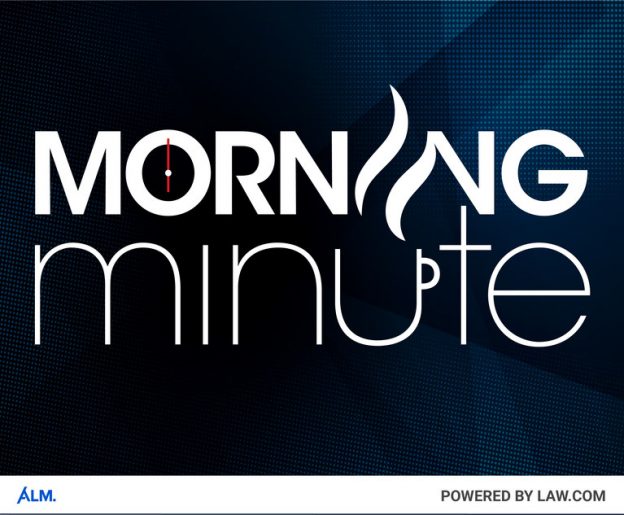Competitive Law Firms Will Double Down on Practice Strengths: The Morning Minute
The news and analysis you need to start your day.
January 04, 2024 at 06:00 AM
4 minute read

Want to get this daily news briefing by email? Here's the sign-up.
WHAT WE'RE WATCHING
PRACTICES MAKE PERFECT - In the next five years or so, all current Am Law 100 firms will reach the $1 billion or $2 billion mark—or fall out of the top 100 and be replaced by firms growing at a faster clip, according to a recent industry report. Yikes. So what should firm leaders do in 2024 if they don't want to get left behind in that competition for scale? In short, firms should have a clear strategy and don't try to be all things to all people, say the authors of the report, issued by Fairfax Associates. Luckily, as Law.com's Andrew Maloney reports, multiple firms in the Am Law 100 appear to be heeding that advice, beginning the year doubling down on their practice area strengths and high-performing locations, and several firm leaders say in interviews that they will continue this focus throughout 2024.
QUESTION YOUR INTELLIGENCE - Despite all the talk about generative artificial intelligence last year (and, boy howdy, there was a lot of talk), there remain plenty of unsettled questions about the technology. But Law.com's Isha Marathe has managed to narrow those queries down to what are arguably the three biggest to keep an eye on as we head further into 2024: How the heck do you train your AI tool? What the heck is going on with AI and copyright? And, for that matter, what the heck is AI anyway? That last question may sound glib but, as we've noted in this space before, judges across U.S. courts have moved to mandate disclosures of generative AI use, prompting increasing calls from experts for the development of some kind of definition that lawyers can safely rely upon.
ON THE RADAR - William M. Krulak Jr. and Ariana K. DeJan-Lenoir of Miles & Stockbridge have entered appearances for vaccine manufacturer Emergent BioSolutions, its top officers and directors in a pending shareholder derivative lawsuit in connection with the drug company's production of COVID-19 vaccines for Johnson & Johnson and AstraZeneca. The suit, filed Dec. 15 in Maryland District Court by Brown Goldstein Levy and the Weiser Law Firm on behalf of Christopher Seaver, contends that certain company insiders sold nearly $42 million of Emergent stock prior to public disclosure of control failures at Emergent's facility. The case, assigned to U.S. District Judge Matthew J. Maddox, is 1:23-cv-03408, Seaver v. Kramer et al. Stay up on the latest state and federal litigation, as well as the latest corporate deals, with Law.com Radar.
EDITOR'S PICKS
|
|
This content has been archived. It is available through our partners, LexisNexis® and Bloomberg Law.
To view this content, please continue to their sites.
Not a Lexis Subscriber?
Subscribe Now
Not a Bloomberg Law Subscriber?
Subscribe Now
NOT FOR REPRINT
© 2025 ALM Global, LLC, All Rights Reserved. Request academic re-use from www.copyright.com. All other uses, submit a request to [email protected]. For more information visit Asset & Logo Licensing.
You Might Like
View All
Was It Ever A Profession? A Look at the History of Law Firms as a Business with RJon Robins
1 minute read
How This Dark Horse Firm Became a Major Player in China

Big Law Sidelined as Asian IPOs in New York Are Dominated by Small Cap Listings

Trump RTO Mandates Won’t Disrupt Big Law Policies—But Client Expectations Might
6 minute readLaw Firms Mentioned
Trending Stories
- 1No Two Wildfires Alike: Lawyers Take Different Legal Strategies in California
- 2Poop-Themed Dog Toy OK as Parody, but Still Tarnished Jack Daniel’s Brand, Court Says
- 3Meet the New President of NY's Association of Trial Court Jurists
- 4Lawyers' Phones Are Ringing: What Should Employers Do If ICE Raids Their Business?
- 5Freshfields Hires Ex-SEC Corporate Finance Director in Silicon Valley
Who Got The Work
J. Brugh Lower of Gibbons has entered an appearance for industrial equipment supplier Devco Corporation in a pending trademark infringement lawsuit. The suit, accusing the defendant of selling knock-off Graco products, was filed Dec. 18 in New Jersey District Court by Rivkin Radler on behalf of Graco Inc. and Graco Minnesota. The case, assigned to U.S. District Judge Zahid N. Quraishi, is 3:24-cv-11294, Graco Inc. et al v. Devco Corporation.
Who Got The Work
Rebecca Maller-Stein and Kent A. Yalowitz of Arnold & Porter Kaye Scholer have entered their appearances for Hanaco Venture Capital and its executives, Lior Prosor and David Frankel, in a pending securities lawsuit. The action, filed on Dec. 24 in New York Southern District Court by Zell, Aron & Co. on behalf of Goldeneye Advisors, accuses the defendants of negligently and fraudulently managing the plaintiff's $1 million investment. The case, assigned to U.S. District Judge Vernon S. Broderick, is 1:24-cv-09918, Goldeneye Advisors, LLC v. Hanaco Venture Capital, Ltd. et al.
Who Got The Work
Attorneys from A&O Shearman has stepped in as defense counsel for Toronto-Dominion Bank and other defendants in a pending securities class action. The suit, filed Dec. 11 in New York Southern District Court by Bleichmar Fonti & Auld, accuses the defendants of concealing the bank's 'pervasive' deficiencies in regards to its compliance with the Bank Secrecy Act and the quality of its anti-money laundering controls. The case, assigned to U.S. District Judge Arun Subramanian, is 1:24-cv-09445, Gonzalez v. The Toronto-Dominion Bank et al.
Who Got The Work
Crown Castle International, a Pennsylvania company providing shared communications infrastructure, has turned to Luke D. Wolf of Gordon Rees Scully Mansukhani to fend off a pending breach-of-contract lawsuit. The court action, filed Nov. 25 in Michigan Eastern District Court by Hooper Hathaway PC on behalf of The Town Residences LLC, accuses Crown Castle of failing to transfer approximately $30,000 in utility payments from T-Mobile in breach of a roof-top lease and assignment agreement. The case, assigned to U.S. District Judge Susan K. Declercq, is 2:24-cv-13131, The Town Residences LLC v. T-Mobile US, Inc. et al.
Who Got The Work
Wilfred P. Coronato and Daniel M. Schwartz of McCarter & English have stepped in as defense counsel to Electrolux Home Products Inc. in a pending product liability lawsuit. The court action, filed Nov. 26 in New York Eastern District Court by Poulos Lopiccolo PC and Nagel Rice LLP on behalf of David Stern, alleges that the defendant's refrigerators’ drawers and shelving repeatedly break and fall apart within months after purchase. The case, assigned to U.S. District Judge Joan M. Azrack, is 2:24-cv-08204, Stern v. Electrolux Home Products, Inc.
Featured Firms
Law Offices of Gary Martin Hays & Associates, P.C.
(470) 294-1674
Law Offices of Mark E. Salomone
(857) 444-6468
Smith & Hassler
(713) 739-1250











